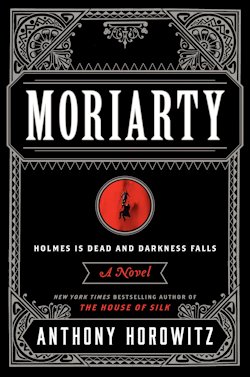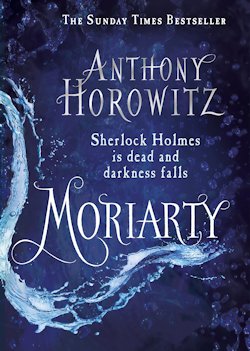The great detective and his greatest enemy are dead—or so it is said. “After the confrontation that the world has come to know as ‘The Final Problem,’ [though] there was nothing final about it, as we now know,” Sherlock Holmes and Professor Moriarty have absented their respective roles, each for his own secretive reasons. So what’s Scotland Yard to do when London is rocked by a series of crimes so indescribably violent that they rival the Ripper’s?
Why, hand over Holmes’ role to Inspector Athelney Jones: a man, you might remember, much maligned by Dr Watson’s depiction of him as a total dolt in ‘The Sign of the Four.’ Since then, however, Jones has “read everything that Mr Holmes has ever written. He has studied his methods and replicated his experiments. He has consulted with every inspector who ever worked with him. He has, in short, made Sherlock Holmes the very paradigm of his own life.”
And in our narrator, Frederick Chase—apparently the pick of Pinkerton’s Detective Agency—Jones’ Holmes has his Watson.
[Read More]
Chase has come to London on the trail of a kingpin of sin in many ways equivalent to Moriarty; a criminal called Clarence Devereux whose reported arrival in the capital is heralded by a sickness of spirit that has “spread like syphilis,” as one of the American mastermind’s pressganged lackeys puts it. “For six weeks the streets and alleyways [have] been running with blood and I can assure you that I’m not employing a metaphor in this particular instance. I mean it. These people [are] vicious.”
Having joined forces for the foreseeable, Chase and Jones soon witness this sickness for themselves. Their initial investigations take them to Bladeston House, the abode of one of Clarence Devereux’s captains. Scotchy Lavelle doesn’t, on the day, give anything away, but before our have-a-go heroes can return with a warrant, the better to poke around the property properly, the entire household is summarily slaughtered.
“I have never,” notes Jones, “encountered a crime like this in England. The Whitechapel Murders, which came straight to mind when I arrived, were barbaric and vile. But even they lacked the cruelty, the cold-blooded calculation that we have witnessed here.” Chase is convinced that this is just the beginning, but what worse could be to come, one wonders?
“The events here at Bladeston House are only the start, the first warning signs of the poison that has entered the bloodstream of [the] country. Maybe Devereux was responsible. Maybe our visit here—for you can be sure that he will have received the intelligence—was enough to persuade him that Lavelle had to be silenced. I don’t know. It all makes me sick. But I fear a great deal more blood may be shed before we arrive at the truth.”
And with that, “the game is very much afoot,” as Jones rather dramatically remarks.
From its seemingly misleading title to its counterpart characters, Moriarty is an incredibly cleverly conceived piece which, like The House of Silk before it, is “so innately faithful to the legacy of Sir Arthur Conan Doyle’s single most celebrated creation as to feel both painstaking and profound.” Indeed, the reading experience is roundly reminiscent of Doyle’s dalliances with the great detective. On the sentence level Horowitz’s storytelling is wilfully stilted and a little long-winded—in all the right ways, I dare say.
The plot’s also pretty solid, if surprisingly straightforward, and its place in the canon—during ’The Great Hiatus’—is clear. Many more adventures could occupy that void, eventually, and I sincerely hope Horowitz is the author the honour falls to. His devotion to the substance and the style and the spirit of Doyle’s stories is practically slavish.
He does, however, factor a fair quantity of his own creativity into the equation. Moriarty certainly wouldn’t be such a success were it not for the cast of crafted characters its narrative depends upon. There is, in the first a fair amount of fan-service. A goodly number of familiar faces return, not least the titular villain, but it is Chase and Jones, working together in the mode of the main men we only momentarily miss—and against the deplorable agoraphobe Devereux in the Professor’s previous place—who steal the show, and neither are characters we know.
Crucially, Horowitz’s characterisation of Jones is distinctly different to that of Doyle’s dope. As his new partner puts it, “the Athelney Jones in that adventure bears very little similarity to the man I knew and who was, I would have said, unequalled to any at Scotland Yard.” Chase, on the other hand—in all his apparent mundanity—is original to Moriarty:
I have investigated fraud, murder, counterfeiting, bank robberies and missing persons—all of which are prevalent in New York. I cannot say that I have used the same methods, the same extraordinary approach that you demonstrated to me this morning. I am dogged in my approach. I am fastidious. I may read a hundred witness statements before I find the two conflicting remarks that will lead me to the truth.
Can you imagine a blander character? Well… wait for it, is all I’ll tell you today.
Moriarty may be a more of a departure from the classic canon than The House of Silk, but for the most part, it satisfies the same elementary itch.
Unfortunately, there’s a problem. A pretty big one. One I can’t talk about without spoiling the novel. Suffice to say that Moriarty’s narrative turns on a twist that’s too telegraphed to be effective; a bit of a gimmick exacerbated by the prolonged retcons it requires at both extremities of the text, in which we learn what’s actually been going on all along.
Anthony Horowitz’s second Sherlock Holmes novel is, then, a text of many strengths. That it feels the need to explain itself—at length—is its single most distressing misstep, but bolstered by a smart cast of characters—old and new—and an absorbing, not to mention aptly positioned plot, Moriarty makes good on the vast majority of its promise.
Moriarty is available October 23rd in the UK from Orion, and December 9th in the US from HarperCollins.
Niall Alexander is an extra-curricular English teacher who reads and writes about all things weird and wonderful for The Speculative Scotsman, Strange Horizons, and Tor.com. He’s been known to tweet, twoo.











